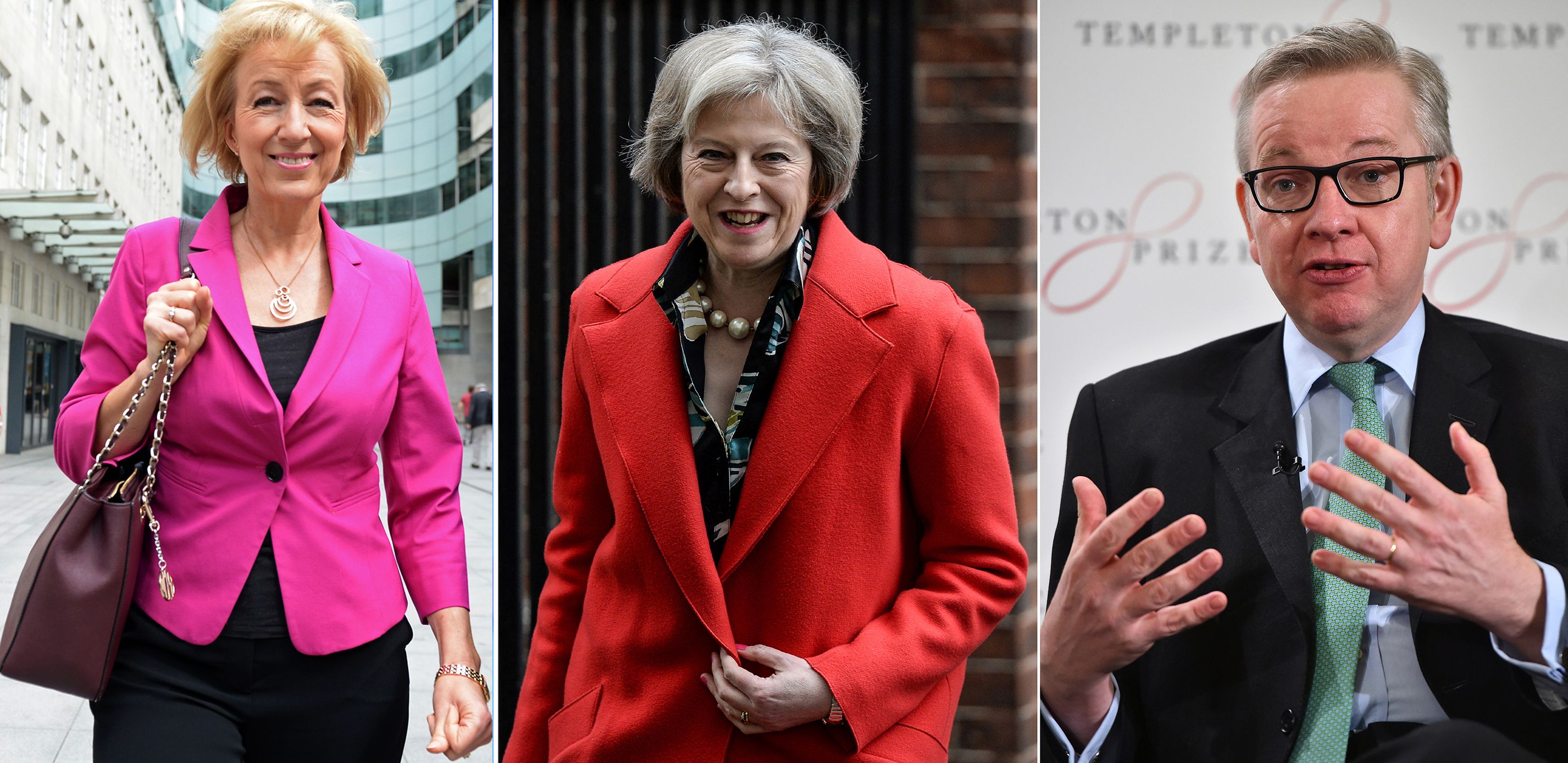![Looks like Britain's next prime minister will be a woman [video : 86817934]](http://videos.usatoday.net/Brightcove2/29906170001/2016/07/29906170001_5026420427001_pm-thumb.jpg?pubId=29906170001)
LONDON — Britain's next prime minister almost certainly will be a woman.
![EPA BRITAIN CONSERVATIVE LEADERSHIP CONTEST POL PARTIES GBR [image : 86801334]](http://www.gannett-cdn.com/media/2016/07/07/USATODAY/USATODAY/636034896923356629-EPA-BRITAIN-CONSERVATIVE-LEADERSHIP-CONTEST.jpg)
That became clear Thursday when members of the ruling Conservative Party chose Home Secretary Theresa May and Energy Minister Andrea Leadsom as the final two candidates to succeed Prime Minister David Cameron, who announced his resignation after the United Kingdom voted to leave the European Union.
The winner would become the U.K.'s first female prime minister since Margaret Thatcher, known as the "Iron Lady," governed from 1979 to 1990.
![EPA EPASELECT BRITAIN PARTIES LEADSOM POL PARTIES GBR [image : 86804080]](http://www.gannett-cdn.com/-mm-/7f81360c61d220c073f7d8c21cd1f11dde449957/c=376-0-3720-2858/local/-/media/2016/07/07/USATODAY/USATODAY/636034922940292646-EPA-epaselect-BRITAIN-PARTIES-LEADSOM.jpg)
The new leader will be chosen by 150,000 Conservative Party members on Sept. 9, after the women campaign around the country, and will also become prime minister unless a new parliamentary election is called first.
Justice Secretary Michael Gove was eliminated in Thursday's vote by Conservative members of Parliament. Gove entered the race last week after unexpectedly withdrawing his support from the early favorite to be prime minister, former London mayor Boris Johnson.
Cameron had spearheaded the losing campaign to remain in the EU, and Johnson was the leader of the Brexit — British exit — camp.
May, 59, who supported staying in the EU, emerged as the favorite for leader in the first round of voting Tuesday by the party's lawmakers.
On Thursday, May won 199 votes, Leadsom 84 and Gove 46.
Gove congratulated May and Leadsom, describing them as “formidable politicians.”
![Thanks to all who supported me. Congratulations to @TheresaMay2016 and @andreale [oembed : 86801844] [oembed : 86801844] [oembed : 86801844] [oembed : 86801844] [oembed : 86801844] [oembed : 86801844] [oembed : 86801844] [oembed : 86801844] [oembed : 86801844] [oembed : 86801844]](/Portals/_default/Skins/PrestoLegacy/CommonCss/images/smartembed.png)
The contentious Brexit referendum, which won 52% to 48% on June 23, continues to reverberate in the U.K. and Europe.
Still to be decided is when Britain formally starts the prolonged process for exiting the bloc, which will be reduced to 27 member countries. That will lead to difficult negotiations on how Britain can maintain favorable trade status and business relationships, and what price the EU will demand in return.
In the wake of the referendum, there has been turmoil in financial markets and the business community. The pound has plummeted in value, some plans for investment in Britain have been put on hold, international firms are weighing moving operations out of Britain, and France and other European nations are trying to move the continent's financial capital from London to Paris or another major city.
“We need strong, proven leadership to negotiate the best deal for Britain as we leave the European Union, to unite our party and our country, and to make Britain a country that works not for a privileged few but for every one of us, " May said following Thursday's party vote.
May has drawn criticism for failing to guarantee that citizens of EU countries living in Britain will be able to remain in the country after Brexit.
May was appointed Home secretary in 2010, after the Conservative Party took control of the government. She is in charge of internal affairs of England and Wales and immigration, national security and citizenship for the U.K. May is the longest-serving official in this post in more than 50 years.
Leadsom, 53, who backed the “leave” campaign in the referendum, entered Parliament in 2010 after a career in financial services. She has less political experience than May and has faced allegations from rivals that she exaggerated her experience in the financial sector.
Her plain-spoken style and opposition to the EU made her popular with the party’s grass-roots members, who are older and more Euro-skeptic.
“I will not use people’s lives as bargaining chips in some negotiation,” Leadsom told supporters Thursday. “I say to all who are legally here that you will be welcome to stay.”
![Pound falls sharply on renewed Brexit fears [oembed : 86793308] [oembed : 86793308] [oembed : 86793308] [oembed : 86793308] [oembed : 86793308] [oembed : 86793308] [oembed : 86793308] [oembed : 86793308] [oembed : 86793308] [oembed : 86793308] [oembed : 86793308] [oembed : 86793308] [oembed : 86793308] [oembed : 86793308] [oembed : 86793308] [oembed : 86793308] [oembed : 86793308] [oembed : 86793308] [oembed : 86793308] [oembed : 86793308] [oembed : 86793308] [oembed : 86793308] [oembed : 86793308] [oembed : 86793308] [oembed : 86793308] [oembed : 86793308] [oembed : 86793308] [oembed : 86793308] [oembed : 86793308] [oembed : 86793308]](/Portals/_default/Skins/PrestoLegacy/CommonCss/images/smartembed.png)
![Brexit backer Farage steps down as UKIP leader [oembed : 86793316] [oembed : 86793316] [oembed : 86793316] [oembed : 86793316] [oembed : 86793316] [oembed : 86793316] [oembed : 86793316] [oembed : 86793316] [oembed : 86793316] [oembed : 86793316] [oembed : 86793316] [oembed : 86793316] [oembed : 86793316] [oembed : 86793316] [oembed : 86793316] [oembed : 86793316] [oembed : 86793316] [oembed : 86793316] [oembed : 86793316] [oembed : 86793316] [oembed : 86793316] [oembed : 86793316] [oembed : 86793316] [oembed : 86793316] [oembed : 86793316] [oembed : 86793316] [oembed : 86793316] [oembed : 86793316] [oembed : 86793316] [oembed : 86793316]](/Portals/_default/Skins/PrestoLegacy/CommonCss/images/smartembed.png)
![United Kingdom withdrawal from the European Union [oembed : 86793322] [oembed : 86793322] [oembed : 86793322] [oembed : 86793322] [oembed : 86793322] [oembed : 86793322] [oembed : 86793322] [oembed : 86793322] [oembed : 86793322] [oembed : 86793322] [oembed : 86793322] [oembed : 86793322] [oembed : 86793322] [oembed : 86793322] [oembed : 86793322] [oembed : 86793322] [oembed : 86793322] [oembed : 86793322] [oembed : 86793322] [oembed : 86793322] [oembed : 86793322] [oembed : 86793322] [oembed : 86793322] [oembed : 86793322] [oembed : 86793322] [oembed : 86793322] [oembed : 86793322] [oembed : 86793322] [oembed : 86793322] [oembed : 86793322]](/Portals/_default/Skins/PrestoLegacy/CommonCss/images/smartembed.png)


